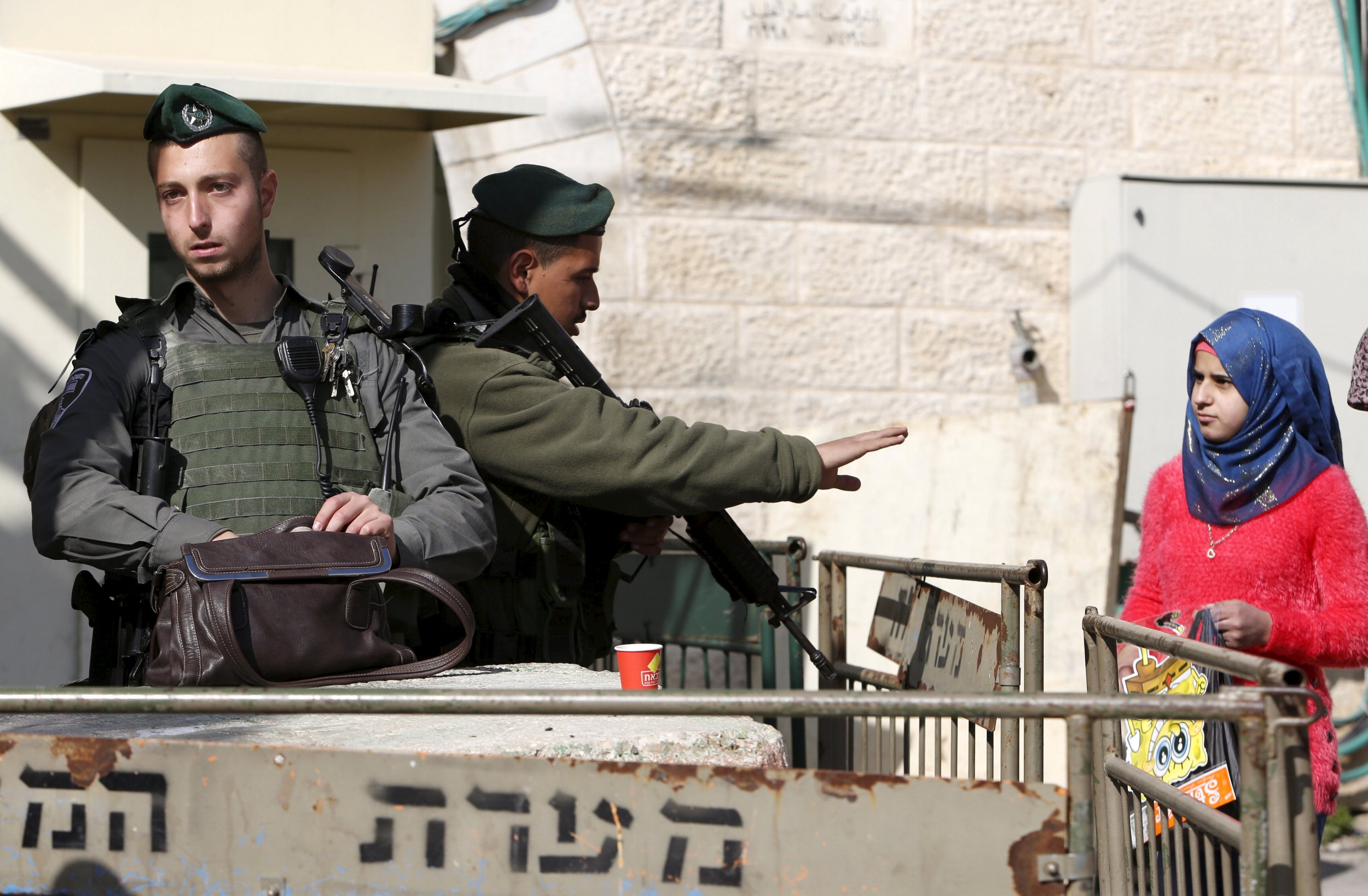
Fayzeh and Emad Abu Shamsiya are stubborn folk. The couple and their five kids have long resisted ongoing harassment by Jewish settlers and the Israeli army and have steadfastly remained in their rented home in Hebron's Tel Rumeidah neighborhood. The damp and crumbling flat is all they can afford since Emad lost his shoemaking job in Israel, at the start of the second Palestinian Intifada, or uprising. But now they are looking for a home outside the neighborhood, and they are not the only ones.
Six families have recently left the neighborhood, as a direct result of unprecedented restrictions applied to Palestinians by the Israeli security forces there, and Hebronites fear this trend is irreversible.
Since October, Israel's security forces have tightened the system of checkpoints and obstacles around the Tel Rumeidah neighborhood, citing security reasons. Even prior to this, soldiers checked everyone leaving and entering the neighborhood, but now anyone without a registered Tel Rumeidah address is denied entry.
Recently, in a move that raised a minor public outcry in Israel, the army has started numbering residents, to coincide with a list kept at the checkpoint. The Israeli military says it has since stopped the system, but Palestinian activist Issa Amro says residents are still being numbered. International volunteers and Israeli anti-occupation activists are also barred entry to the neighborhood, though their presence is vital for documenting harm caused to the residents, and even the authorities do not claim they pose a security threat.
Since the beginning of the current wave of violence in the West Bank in October, Israeli forces have killed 19 Palestinians in the town of Hebron, according to B'Tselem's figures, most of them after they attacked Israelis or were suspected of doing so. A Palestinian killed an Israeli civilian in one of the attacks. But in some cases, Palestinians were shot even after they no longer posed any danger to Israelis.
Tel Rumeidah is home to some 50 Palestinian families whose daily lives were already subject to travel restrictions and recurrent harassment and settler attacks. Ever since the new restrictions were imposed, residents now leave their homes only for work, school or urgent matters, and relatives cannot visit them.
Emad abu Shamsiyah told B'Tselem: "I am number 242. The neighborhood became a sort of prison for the residents, the streets are empty. My five young children and my wife and I are stuck at home most of the time. Foreigners and relatives can't come and visit, movement around the neighborhood has become dangerous because of the settlers who walk down the road and provoke the residents. I'm looking for a cheap house outside which will end this suffering for me and my family. Many people who rent homes are thinking of leaving."
While movement restrictions imposed on Palestinians in Hebron change from time to time, they are always governed by the "principle of separation," a regime of physical and legal segregation between the around 800 Israeli settlers living in a string of settlement points around the old city of Hebron, who receive the state's protection, and the Palestinian majority, which pays the price of this protection. This policy has led to the financial collapse of Hebron's downtown and a massive departure by Palestinian residents.
Less than a five-minute walk from Tel Rumeidah, the results of this policy are in plain view. Palestinians are prohibited from entering the area which used to be the heart of Hebron's only commercial center and it is now a ghost town, with hundreds of homes and stores sealed and emptied of their Palestinian inhabitants. In the old market district of Shuhada Street, the authorities prohibit Palestinians from even walking the streets.
Zeidan Al-Sharabati, another resident, is not ready to give up just yet. "The army wrote the number 315 on the cover of my ID card," he told a B'Tselem field worker. "At first, I assumed the closure will be short lived. But three months later, things have become unbearable. The closure has separated us from relatives outside the neighborhood. We own our home and aren't considering leaving the neighborhood, but I don't know whether we can stand another month of this."
The IDF spokesperson told the media that restrictions are intended to prevent harm to civilians, but that the military would "continue to allow as normal a fabric of life as possible for all residents of the sector, while taking the necessary security measures given the situation."
This statement is a far cry from reality. There has been no "normal fabric of life" in Hebron for quite some time. Individual residents of Tel Rumeidah are suspected of no wrongdoing and are forced to suffer serious disruptions in their daily lives simply because they live or work in neighborhoods in which the Israeli government has placed settlers.
The residents suspect that under the guise of the security crisis, the authorities are trying to extend the settler-only corridor that runs along the settlement points up to the Israeli settlement in Tel Rumeidah, thereby extending also the no-go area for Palestinians in Hebron. The consequences for their community, they fear, will be grim.
Sarit Michaeli is the spokeswoman for the Israeli human rights NGO B'TSelem.
Uncommon Knowledge
Newsweek is committed to challenging conventional wisdom and finding connections in the search for common ground.
Newsweek is committed to challenging conventional wisdom and finding connections in the search for common ground.
About the writer
To read how Newsweek uses AI as a newsroom tool, Click here.








